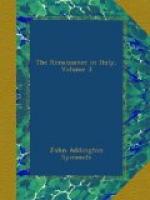After killing the musketeer, Cellini retired for refuge to the house of Alessandro de’ Medici, Duke of Civita di Penna, who had been his brother’s patron. The matter reached the Pope’s ears, for whom Benvenuto was at work upon crown jewels. Clement sent for him, and simply said: “Now you have recovered your health, Benvenuto, take care of yourself.” This shows how little they thought of homicide in Rome. After killing a man, some powerful protector had to be sought, who was usually a cardinal, since the cardinals had right of sanctuary in their palaces. There the assassin lay in hiding, in order to avoid his victim’s friends and relatives, until such time as a pardon and safe-conduct and absolution had been obtained from his Holiness. When Cellini, soon after this occurrence, stabbed a private enemy, by name Pompeo, two cardinals were anxious to screen him from pursuit, and disputed the privilege of harbouring so talented a criminal.[365] The Pope, with marvellous good-humour, observed: “I have never heard of the death of Pompeo, but often of Benvenuto’s provocation; so let a safe-conduct be instantly made out, and that will secure him from all manner of danger.” A friend of Pompeo’s who was present, ventured to insinuate that this was dangerous policy. The Pope put him down at once by saying, “You do not understand these matters; I would have you know that men who are unique in their profession, like Benvenuto, are not subject to the laws.” Whether Paul really said these words, may be doubted; but it is clear that much was conceded to a clever workman, and that the laws were a mere brutum fulmen. No man of spirit appealed to them. Cellini, for example, was poisoned by a parish priest near Florence:[366] yet he never brought the man to justice; and in the case of his own murders, he only dreaded the retaliation of his victims’ kinsmen. On one occasion, indeed, the civil arm came down upon him; when the city guard attempted to arrest him for Pompeo’s assassination. He beat them off with swords and sticks; and, after all, it appeared that they were only acting at the instigation of Pier Luigi Farnese, whom Benvenuto had offended.
During his residence at Rome, Cellini witnessed an incantation conducted in the Colosseum by a Sicilian priest and necromancer. The conjurer and the artist, accompanied by two friends, and by a boy, who was to act as medium, went by night to the amphitheatre. The magic circle was drawn; fires were lighted, and perfumes scattered on the flames. Then the spirit-seer began his charms, calling in Hebrew, Greek, and Latin, or what passed for such, upon the leaders of the hosts of hell. The whole hollow space now filled with phantoms, surging up by legions, rushing down from the galleries, issuing from subterranean caverns, and wheeling to and fro with signs of fury. All the party, says Cellini, were thrown into consternation, except himself, who, though terribly afraid, kept up the fainting spirits of the rest. At last the




